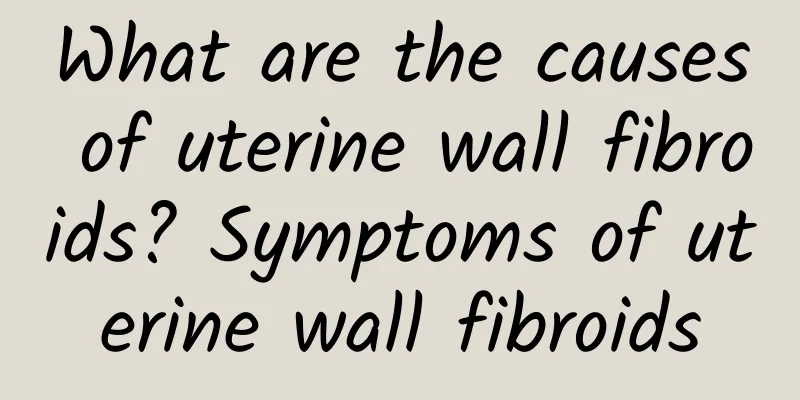What are the causes of uterine wall fibroids? Symptoms of uterine wall fibroids

|
What are the causes of uterine wall fibroids? Symptoms of uterine wall fibroids Uterine wall fibroids are a common gynecological disease, specifically referring to benign tumors that occur in the uterine wall. They are formed by abnormal proliferation of smooth muscle cells in the uterine wall, usually the formation of single or multiple fibroids. Although fibroids are benign, they can have a serious impact on women's lives and health. This article will introduce the causes and common symptoms of uterine wall fibroids. 1. Causes The cause of uterine wall fibroids is still not completely clear, but the following factors are generally believed to be related to their occurrence: 1.1 Hormonal factors: Increased levels of estrogen are closely related to the occurrence of uterine fibroids. Estrogen can stimulate the growth of muscle cells in the uterine wall, so fibroids may occur or grow during pregnancy, the menstrual cycle of young women, and menopause. 1.2 Genetic factors: Genetic predisposition is considered to be one of the important factors in the occurrence of uterine fibroids. If someone in the family has uterine fibroids, the chance of getting the disease is higher. 1.3 Other factors: Obesity, infertility, excessive drinking and smoking are also considered to be related to the occurrence of uterine fibroids. 2. Symptoms Symptoms of uterine wall fibroids vary from person to person, but the following symptoms are common: 2.1 Menstrual abnormalities: Uterine fibroids may cause excessive menstrual flow and menstrual cycle disorders. Patients may feel uncomfortable with the duration, amount of blood, and bleeding pattern of the menstrual period. 2.2 Pelvic pain: Uterine fibroids may cause pain and discomfort in the pelvic area. This pain may be fixed or intermittent. 2.3 Compression symptoms: When the fibroids grow larger and compress the surrounding organs, the patient may experience difficulty urinating, frequent urination, constipation or rectal compression symptoms. 2.4 Infertility: Uterine fibroids may cause infertility or recurrent miscarriage. The location and size of the fibroids may hinder the implantation of the fertilized egg or the growth of the fetus. 2.5 Atypical bleeding: Fibroids may cause vaginal bleeding outside of menstrual periods. Intermittent bleeding or irregular bleeding may occur, sometimes accompanied by pain. Through this article, we can understand the causes and common symptoms of uterine fibroids. We can see that the occurrence of uterine fibroids is related to hormones, genetics and other factors. Symptoms mainly include abnormal menstruation, pelvic pain, compression symptoms, infertility and atypical bleeding. Because uterine wall fibroids can seriously affect women's lives and health, women should seek medical advice once symptoms occur. Doctors can confirm the diagnosis and develop individualized treatment plans through physical examinations, ultrasound, MRI and other examinations. |
>>: Why can't you eat red dates and longans when you have uterine fibroids?
Recommend
Stop before, during and after strenuous exercise! The hidden dangers of energy drinks
If you like to drink a can of energy drink to boo...
What is the treatment effect of pelvic effusion? Does pelvic effusion affect pregnancy?
What is the test method for pelvic effusion? Pelv...
How to cure chocolate cyst
Will a chocolate cyst go away on its own? Patient...
The reason why a small number of maternal traumas can cause vulvar leukoplakia
Benign keratotic lesions in the vulva are called ...
Do you know what causes cervical erosion?
Cervical erosion is not an independent disease, b...
What are the inducing factors of uterine fibroids? Can poor work and rest lead to uterine fibroids?
This disease usually manifests itself as abdomina...
Patients with ovarian cysts should understand the diagnosis basis in advance
Ovarian cysts are a very common disease among wom...
"Spring stepmother noodles" are prone to illness, nutritionists teach "7 major nutrients" to improve immunity!
As the saying goes, "Spring is like the seas...
Is it true that if you have uterine fibroids, your menstrual flow will be heavy?
Patients with uterine fibroids may not have obvio...
Are you still starving yourself to lose weight? What French gourmets say
All methods of treating obesity should abide by t...
Do uterine fibroids require surgery?
Uterine fibroids are benign tumors formed by the ...
Causes of premature ovarian failure
Causes of premature ovarian failure: Most of them...
Can drinking soy milk help you lose weight? ! PK Black Soy Milk, Salty Soy Milk Which one has the highest calories?
Breakfast is the most important meal to start the...
What happens when a girl gets angry during her period? Causes irregular menstruation
If a girl gets angry during her period, it will d...
Symptomatic weight loss is more effective! TCM looks at 4 types of obesity
Traditional Chinese medicine divides obesity into...









